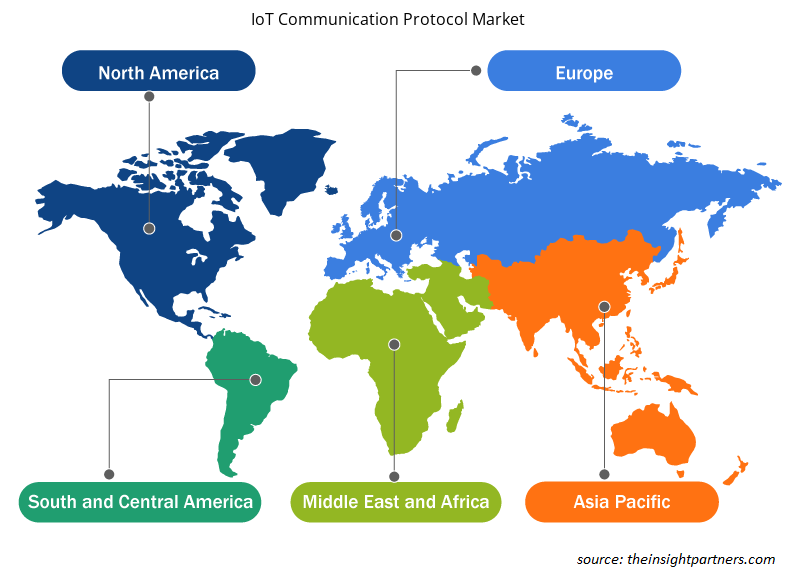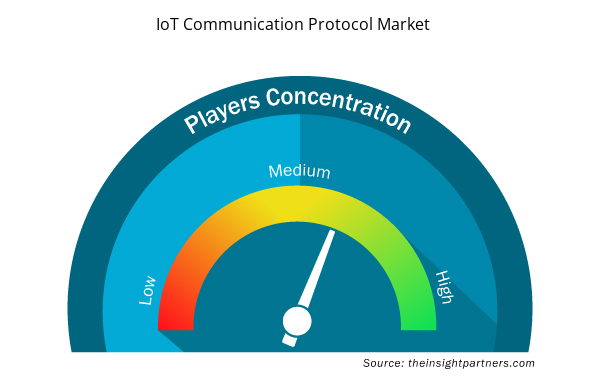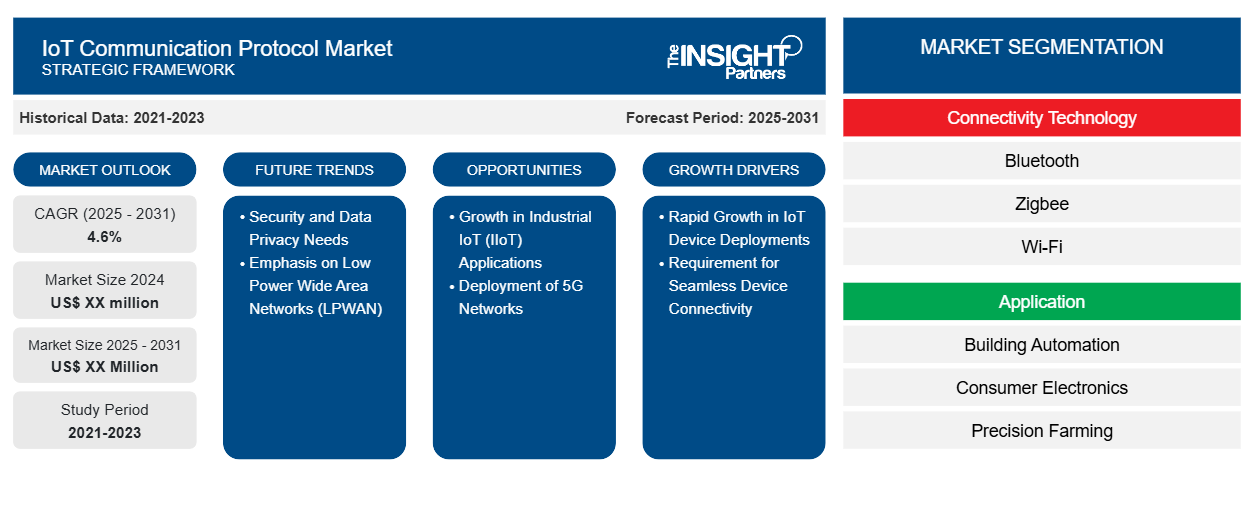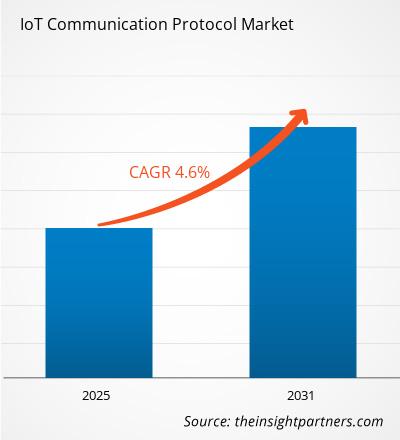من المتوقع أن يسجل سوق بروتوكول اتصالات إنترنت الأشياء معدل نمو سنوي مركب بنسبة 4.6٪ من عام 2023 إلى عام 2031، مع توسع حجم السوق من XX مليون دولار أمريكي في عام 2023 إلى XX مليون دولار أمريكي بحلول عام 2031.
تم تقسيم التقرير حسب تكنولوجيا الاتصال (بلوتوث، زيجبي، واي فاي، الخلوي، NFC، GNSS)، التطبيق (أتمتة البناء، الإلكترونيات الاستهلاكية، الزراعة الدقيقة، الرعاية الصحية والأجهزة القابلة للارتداء، الصناعة، السيارات والنقل، وغيرها). تم تقسيم التحليل العالمي بشكل أكبر على المستوى الإقليمي والدول الرئيسية. يقدم التقرير القيمة بالدولار الأمريكي للتحليل والقطاعات المذكورة أعلاه.
غرض التقرير
يهدف تقرير سوق بروتوكولات اتصالات إنترنت الأشياء الصادر عن The Insight Partners إلى وصف المشهد الحالي والنمو المستقبلي وأهم العوامل الدافعة والتحديات والفرص. وسيوفر هذا رؤى لمختلف أصحاب المصلحة في الأعمال التجارية، مثل:
- مزودي/مصنعي التكنولوجيا: لفهم ديناميكيات السوق المتطورة ومعرفة فرص النمو المحتملة، وتمكينهم من اتخاذ قرارات استراتيجية مستنيرة.
- المستثمرون: إجراء تحليل شامل للاتجاهات فيما يتعلق بمعدل نمو السوق، وتوقعات السوق المالية، والفرص المتاحة عبر سلسلة القيمة.
- الهيئات التنظيمية: لتنظيم السياسات ومراقبة الأنشطة في السوق بهدف تقليل الانتهاكات والحفاظ على ثقة المستثمرين والحفاظ على سلامة السوق واستقرارها.
تجزئة سوق بروتوكولات الاتصالات الخاصة بإنترنت الأشياء
تكنولوجيا الاتصال
- بلوتوث
- زيجبي
- واي فاي
- خلوي
- تقنية الاتصال قريب المدى
- نظام الملاحة العالمي عبر الأقمار الصناعية
طلب
- أتمتة المباني
- الالكترونيات الاستهلاكية
- الزراعة الدقيقة
- الرعاية الصحية والأجهزة القابلة للارتداء
- صناعي
- السيارات والنقل
- آحرون
قم بتخصيص هذا التقرير ليناسب متطلباتك
ستحصل على تخصيص لأي تقرير - مجانًا - بما في ذلك أجزاء من هذا التقرير، أو تحليل على مستوى الدولة، وحزمة بيانات Excel، بالإضافة إلى الاستفادة من العروض والخصومات الرائعة للشركات الناشئة والجامعات
- احصل على أهم اتجاهات السوق الرئيسية لهذا التقرير.ستتضمن هذه العينة المجانية تحليلاً للبيانات، بدءًا من اتجاهات السوق وحتى التقديرات والتوقعات.
محركات نمو سوق بروتوكول الاتصالات إنترنت الأشياء
- النمو السريع في نشر أجهزة إنترنت الأشياء: من بين أهم محركات سوق بروتوكولات اتصالات إنترنت الأشياء النمو السريع لنشر أجهزة إنترنت الأشياء. مع نمو عدد الأجهزة المتصلة عبر الصناعات في الرعاية الصحية والمنازل الذكية والتصنيع والسيارات والزراعة، أصبحت بروتوكولات الاتصال الفعالة والقابلة للتطوير والآمنة أكثر أهمية. يتطلب تنوع أجهزة إنترنت الأشياء، من أجهزة الاستشعار منخفضة الطاقة إلى الآلات الصناعية المعقدة، أنواعًا متعددة من بروتوكولات الاتصال للعمل الفعال. مع نشر أجهزة إنترنت الأشياء بشكل متزايد في المدن الذكية والمنازل والمؤسسات، فإن الحاجة إلى بروتوكولات اتصال قوية للتعامل مع احتياجات الاتصال المتنوعة هي التي تدفع نمو السوق.
- متطلبات الاتصال السلس للأجهزة: إن الطلب على الاتصال السلس والموثوق للأجهزة هو محرك رئيسي آخر لسوق بروتوكولات اتصالات إنترنت الأشياء. ومع نمو أنظمة إنترنت الأشياء، من المهم التأكد من أن الأجهزة من مختلف الشركات المصنعة والقدرات المتنوعة يمكنها التواصل بشكل فعال مع بعضها البعض. يساعد دمج بروتوكولات الاتصال المختلفة، مثل Wi-Fi وBluetooth وZigbee و5G وLPWAN، في تحقيق اتصال سلس. على سبيل المثال، داخل المنزل الذكي، قد تكون الأجهزة عبارة عن ترموستات وكاميرات أمنية وأضواء، وقد تحتاج جميعها إلى التواصل مع بعضها البعض على الرغم من متطلبات الطاقة ونطاقاتها المختلفة. في نفس الشبكة، تعد الدرجة العالية من إدارة معيار الاتصال المتنوع هذا عاملاً حاسماً يدفع إلى اعتماد بروتوكولات اتصالات إنترنت الأشياء.
اتجاهات مستقبل سوق بروتوكولات الاتصالات في إنترنت الأشياء
- احتياجات الأمن وخصوصية البيانات: مع تزايد شيوع أجهزة إنترنت الأشياء، فإن المخاوف المتعلقة بالأمن وخصوصية البيانات تدفع إلى تطوير وتبني بروتوكولات الاتصال المتخصصة. يجب أن تتضمن هذه البروتوكولات تدابير التشفير والمصادقة وسلامة البيانات لضمان حماية البيانات الحساسة المنقولة بين الأجهزة من الوصول غير المصرح به والتلاعب. نظرًا لأن تطبيقات إنترنت الأشياء تنطوي على معلومات حساسة، مثل بيانات الرعاية الصحية أو التفاصيل المالية الشخصية، فيجب أن تلبي بروتوكولات الاتصال معايير أمنية صارمة. لقد أدى الاهتمام المتزايد بخصوصية البيانات ومنع التهديدات السيبرانية في شبكات إنترنت الأشياء إلى جعل البروتوكولات المعززة بالأمان محركًا مهمًا في السوق.
- التركيز على شبكات المنطقة الواسعة منخفضة الطاقة (LPWAN): إن الطلب المتزايد على تقنيات الاتصالات منخفضة الطاقة وطويلة المدى يدفع إلى تبني حلول شبكات المنطقة الواسعة منخفضة الطاقة في سوق منصات الاتصالات الخاصة بإنترنت الأشياء. تتيح هذه الشبكات، بما في ذلك شبكات LoRa وNB-IoT، نقل البيانات بكفاءة من الأجهزة الموجودة في المناطق النائية، مما يجعلها مثالية للتطبيقات في الزراعة والمدن الذكية وتتبع الأصول، مما يدعم انتشار نشر إنترنت الأشياء.
فرص سوق بروتوكولات الاتصالات الخاصة بإنترنت الأشياء
- النمو في تطبيقات إنترنت الأشياء الصناعية (IIoT): يعد النمو في تطبيقات إنترنت الأشياء الصناعية (IIoT) محركًا رئيسيًا آخر لسوق بروتوكولات اتصالات إنترنت الأشياء. في قطاعات التصنيع والخدمات اللوجستية والطاقة والزراعة، تكون أجهزة إنترنت الأشياء مسؤولة عن تعزيز الكفاءة والإنتاجية والأداء التشغيلي. تتطلب تطبيقات إنترنت الأشياء الصناعية بروتوكولات اتصال خاصة تسمح بنقل البيانات في الوقت الفعلي وتوفر اتصالات منخفضة الكمون في البيئات المعادية. من بين هذه البروتوكولات، يتم استخدام Zigbee وLoRaWAN و5G بشكل متزايد في التطبيقات الصناعية بسبب الاتصال الموثوق به بعيد المدى واستهلاك الطاقة الأدنى والتشغيل القوي. مع زيادة القبول الصناعي للأتمتة والصيانة التنبؤية والمراقبة عن بعد، سيزداد الطلب على بروتوكولات اتصالات إنترنت الأشياء الموثوقة في قطاع إنترنت الأشياء الصناعية في السنوات القادمة.
- نشر شبكات الجيل الخامس: يشهد سوق بروتوكولات الاتصالات في إنترنت الأشياء ثورة مع نشر شبكات الجيل الخامس. وبفضل سرعتها الفائقة وزمن انتقالها المنخفض وموثوقيتها الفائقة، تعد شبكات الجيل الخامس متطلبًا مثاليًا للاتصالات عالية الحجم وفي الوقت الفعلي في أجهزة إنترنت الأشياء. مع الجيل الخامس، يمكن لأجهزة إنترنت الأشياء نقل البيانات بسرعات أعلى بكثير، وبالتالي يمكن نشر حالات استخدام جديدة مثل المركبات ذاتية القيادة والجراحات عن بعد والمدن الذكية. يفتح الجمع بين النطاق الترددي العالي وزمن انتقالها المنخفض لشبكات الجيل الخامس مع بروتوكولات اتصالات إنترنت الأشياء إمكانيات جديدة للصناعات التي تتطلب نقل بيانات سريعًا ودون انقطاع. ستؤدي التوسعات في شبكات الجيل الخامس إلى تغذية تطوير بروتوكولات الاتصالات المتطورة المناسبة لتطبيقات إنترنت الأشياء الأكثر تقدمًا وكثافة في النطاق الترددي.
رؤى إقليمية حول سوق بروتوكولات الاتصالات الخاصة بإنترنت الأشياء
لقد قام المحللون في Insight Partners بشرح الاتجاهات والعوامل الإقليمية المؤثرة على سوق بروتوكول اتصالات إنترنت الأشياء طوال فترة التوقعات بشكل شامل. يناقش هذا القسم أيضًا قطاعات سوق بروتوكول اتصالات إنترنت الأشياء والجغرافيا في جميع أنحاء أمريكا الشمالية وأوروبا ومنطقة آسيا والمحيط الهادئ والشرق الأوسط وأفريقيا وأمريكا الجنوبية والوسطى.

- احصل على البيانات الإقليمية المحددة لسوق بروتوكول اتصالات إنترنت الأشياء
نطاق تقرير سوق بروتوكول اتصالات إنترنت الأشياء
| سمة التقرير | تفاصيل |
|---|---|
| حجم السوق في عام 2023 | XX مليون دولار أمريكي |
| حجم السوق بحلول عام 2031 | XX مليون دولار أمريكي |
| معدل النمو السنوي المركب العالمي (2023 - 2031) | 4.6% |
| البيانات التاريخية | 2021-2022 |
| فترة التنبؤ | 2024-2031 |
| القطاعات المغطاة | بواسطة تقنية الاتصال
|
| المناطق والدول المغطاة | أمريكا الشمالية
|
| قادة السوق وملفات تعريف الشركات الرئيسية |
|
كثافة اللاعبين في سوق بروتوكولات الاتصالات الخاصة بإنترنت الأشياء: فهم تأثيرها على ديناميكيات الأعمال
يشهد سوق بروتوكولات اتصالات إنترنت الأشياء نموًا سريعًا، مدفوعًا بالطلب المتزايد من المستخدم النهائي بسبب عوامل مثل تفضيلات المستهلكين المتطورة والتقدم التكنولوجي والوعي الأكبر بفوائد المنتج. ومع ارتفاع الطلب، تعمل الشركات على توسيع عروضها والابتكار لتلبية احتياجات المستهلكين والاستفادة من الاتجاهات الناشئة، مما يؤدي إلى زيادة نمو السوق.
تشير كثافة اللاعبين في السوق إلى توزيع الشركات أو المؤسسات العاملة في سوق أو صناعة معينة. وهي تشير إلى عدد المنافسين (اللاعبين في السوق) الموجودين في مساحة سوق معينة نسبة إلى حجمها أو قيمتها السوقية الإجمالية.
الشركات الرئيسية العاملة في سوق بروتوكول اتصالات إنترنت الأشياء هي:
- شركة مايكرو شيب للتكنولوجيا
- شركة NXP لأشباه الموصلات
- شركة إس تي ميكروإلكترونيكس إن في
- شركة تكساس إنسترومنتس
- شركة ميدياتك
- شركة إينوكيان المحدودة
إخلاء المسؤولية : الشركات المذكورة أعلاه ليست مرتبة بأي ترتيب معين.

- احصل على نظرة عامة على أهم اللاعبين الرئيسيين في سوق بروتوكولات اتصالات إنترنت الأشياء
نقاط البيع الرئيسية
- التغطية الشاملة: يغطي التقرير بشكل شامل تحليل المنتجات والخدمات والأنواع والمستخدمين النهائيين لسوق بروتوكول الاتصالات إنترنت الأشياء، مما يوفر صورة شاملة.
- تحليل الخبراء: تم تجميع التقرير على أساس الفهم العميق لخبراء الصناعة والمحللين.
- معلومات محدثة: يضمن التقرير أهمية الأعمال التجارية بسبب تغطيته للمعلومات الحديثة واتجاهات البيانات.
- خيارات التخصيص: يمكن تخصيص هذا التقرير لتلبية متطلبات العملاء المحددة وبما يتناسب مع استراتيجيات العمل بشكل مناسب.
وبالتالي، يمكن أن يساعد تقرير البحث حول سوق بروتوكولات الاتصالات الخاصة بإنترنت الأشياء في تمهيد الطريق لفك شفرة وفهم سيناريو الصناعة وآفاق النمو. ورغم وجود بعض المخاوف المشروعة، فإن الفوائد الإجمالية لهذا التقرير تميل إلى التفوق على العيوب.
- التحليل التاريخي (سنتان)، السنة الأساسية، التوقعات (7 سنوات) مع معدل النمو السنوي المركب
- تحليل PEST و SWOT
- حجم السوق والقيمة / الحجم - عالميًا وإقليميًا وقطريًا
- الصناعة والمنافسة
- مجموعة بيانات Excel


- Print Management Software Market
- Flexible Garden Hoses Market
- Drain Cleaning Equipment Market
- Vision Guided Robotics Software Market
- Playout Solutions Market
- Small Internal Combustion Engine Market
- Wire Harness Market
- Underwater Connector Market
- Architecture Software Market
- Electronic Health Record Market

Report Coverage
Revenue forecast, Company Analysis, Industry landscape, Growth factors, and Trends

Segment Covered
This text is related
to segments covered.

Regional Scope
North America, Europe, Asia Pacific, Middle East & Africa, South & Central America

Country Scope
This text is related
to country scope.
الأسئلة الشائعة
Some of the customization options available based on the request are an additional 3-5 company profiles and country-specific analysis of 3-5 countries of your choice. Customizations are to be requested/discussed before making final order confirmation as our team would review the same and check the feasibility
Security and Data Privacy Needs is anticipated to play a significant role in the global IoT communication protocol market in the coming years
The report can be delivered in PDF/PPT format; we can also share excel dataset based on the request
The major factors driving the IoT communication protocol market are:
1. Rapid Growth in IoT Device Deployments
2. Requirement for Seamless Device Connectivity
The IoT Communication Protocol Market is estimated to witness a CAGR of 4.6% from 2023 to 2031
- Atmel Corporation
- Ceva, Inc.
- Enocean GmbH
- Gainspan Corporation
- Mediatek Inc.
- Mindtree Ltd.
- NXP Semiconductors N.V.
- STMicroelectronics N.V.
- Synopsys, Inc.
- Texas Instruments Inc.
The Insight Partners performs research in 4 major stages: Data Collection & Secondary Research, Primary Research, Data Analysis and Data Triangulation & Final Review.
- Data Collection and Secondary Research:
As a market research and consulting firm operating from a decade, we have published and advised several client across the globe. First step for any study will start with an assessment of currently available data and insights from existing reports. Further, historical and current market information is collected from Investor Presentations, Annual Reports, SEC Filings, etc., and other information related to company’s performance and market positioning are gathered from Paid Databases (Factiva, Hoovers, and Reuters) and various other publications available in public domain.
Several associations trade associates, technical forums, institutes, societies and organization are accessed to gain technical as well as market related insights through their publications such as research papers, blogs and press releases related to the studies are referred to get cues about the market. Further, white papers, journals, magazines, and other news articles published in last 3 years are scrutinized and analyzed to understand the current market trends.
- Primary Research:
The primarily interview analysis comprise of data obtained from industry participants interview and answers to survey questions gathered by in-house primary team.
For primary research, interviews are conducted with industry experts/CEOs/Marketing Managers/VPs/Subject Matter Experts from both demand and supply side to get a 360-degree view of the market. The primary team conducts several interviews based on the complexity of the markets to understand the various market trends and dynamics which makes research more credible and precise.
A typical research interview fulfils the following functions:
- Provides first-hand information on the market size, market trends, growth trends, competitive landscape, and outlook
- Validates and strengthens in-house secondary research findings
- Develops the analysis team’s expertise and market understanding
Primary research involves email interactions and telephone interviews for each market, category, segment, and sub-segment across geographies. The participants who typically take part in such a process include, but are not limited to:
- Industry participants: VPs, business development managers, market intelligence managers and national sales managers
- Outside experts: Valuation experts, research analysts and key opinion leaders specializing in the electronics and semiconductor industry.
Below is the breakup of our primary respondents by company, designation, and region:

Once we receive the confirmation from primary research sources or primary respondents, we finalize the base year market estimation and forecast the data as per the macroeconomic and microeconomic factors assessed during data collection.
- Data Analysis:
Once data is validated through both secondary as well as primary respondents, we finalize the market estimations by hypothesis formulation and factor analysis at regional and country level.
- Macro-Economic Factor Analysis:
We analyse macroeconomic indicators such the gross domestic product (GDP), increase in the demand for goods and services across industries, technological advancement, regional economic growth, governmental policies, the influence of COVID-19, PEST analysis, and other aspects. This analysis aids in setting benchmarks for various nations/regions and approximating market splits. Additionally, the general trend of the aforementioned components aid in determining the market's development possibilities.
- Country Level Data:
Various factors that are especially aligned to the country are taken into account to determine the market size for a certain area and country, including the presence of vendors, such as headquarters and offices, the country's GDP, demand patterns, and industry growth. To comprehend the market dynamics for the nation, a number of growth variables, inhibitors, application areas, and current market trends are researched. The aforementioned elements aid in determining the country's overall market's growth potential.
- Company Profile:
The “Table of Contents” is formulated by listing and analyzing more than 25 - 30 companies operating in the market ecosystem across geographies. However, we profile only 10 companies as a standard practice in our syndicate reports. These 10 companies comprise leading, emerging, and regional players. Nonetheless, our analysis is not restricted to the 10 listed companies, we also analyze other companies present in the market to develop a holistic view and understand the prevailing trends. The “Company Profiles” section in the report covers key facts, business description, products & services, financial information, SWOT analysis, and key developments. The financial information presented is extracted from the annual reports and official documents of the publicly listed companies. Upon collecting the information for the sections of respective companies, we verify them via various primary sources and then compile the data in respective company profiles. The company level information helps us in deriving the base number as well as in forecasting the market size.
- Developing Base Number:
Aggregation of sales statistics (2020-2022) and macro-economic factor, and other secondary and primary research insights are utilized to arrive at base number and related market shares for 2022. The data gaps are identified in this step and relevant market data is analyzed, collected from paid primary interviews or databases. On finalizing the base year market size, forecasts are developed on the basis of macro-economic, industry and market growth factors and company level analysis.
- Data Triangulation and Final Review:
The market findings and base year market size calculations are validated from supply as well as demand side. Demand side validations are based on macro-economic factor analysis and benchmarks for respective regions and countries. In case of supply side validations, revenues of major companies are estimated (in case not available) based on industry benchmark, approximate number of employees, product portfolio, and primary interviews revenues are gathered. Further revenue from target product/service segment is assessed to avoid overshooting of market statistics. In case of heavy deviations between supply and demand side values, all thes steps are repeated to achieve synchronization.
We follow an iterative model, wherein we share our research findings with Subject Matter Experts (SME’s) and Key Opinion Leaders (KOLs) until consensus view of the market is not formulated – this model negates any drastic deviation in the opinions of experts. Only validated and universally acceptable research findings are quoted in our reports.
We have important check points that we use to validate our research findings – which we call – data triangulation, where we validate the information, we generate from secondary sources with primary interviews and then we re-validate with our internal data bases and Subject matter experts. This comprehensive model enables us to deliver high quality, reliable data in shortest possible time.


 احصل على عينة مجانية لهذا التقرير
احصل على عينة مجانية لهذا التقرير